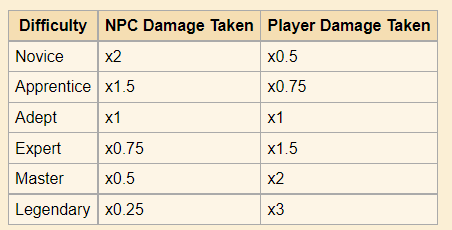I was recently reading about the various game content rating systems in place in various areas of the world. When describing the PEGI system, Wikipedia observes, "The age rating does not indicate the difficulty of the game or the skill required to play it.". The overview of the North American ESRB rating system, by its focus on content factors (such as violence and sexuality), implies that game difficulty is not a factor there either.
That really makes me wonder - is there some sort of standardized scale or rating system to describe the difficulty level of a game as opposed to the level of mature content in the game? I recall playing many games in the 1980's that were wickedly hard compared to the games of today - you had to twitch that joystick just right repeatedly for several pulse-pounding minutes to advance to the next stage, but the content was much tamer than today - no blood or nudity to speak of, extremely minimal use of four-letter words, etc. Such games would merit very low ratings on the ESRB or PEGI scales but are probably very inappropriate for little children.
To be clear, I'm very aware that designing a workable scale or framework for rating game difficulty is itself a challenging task. That's why I'm curious if such a framework meaningfully exists at all, even if it has known flaws or is not very well respected.
As for the use case of such a rating system, perhaps I am looking for a game where the difficulty level does not correspond to its content level. For example, this month I might want a wickedly hard game with minimally offensive content to bring to my local elementary school's after-school enrichment program for rising overachievers, and another month I might need to blow off some steam and desire a super-easy game that will let me run around decapitating NPC's and desecrating their corpses without having to make complex platform jumps or solve IQ puzzles first.
In response to a comment by Nolonar, I am aware that game difficulty is a multifaceted concept (e.g. one player might be very good at making precise jumps but lack the reading level to understand the game instructions, or vice versa), but my response is that content is also multifaceted. A game might be devoid of sexual content but be very violent, or a game could be low on both violence and sexuality but include positive references to drug use or disfavored political movements. Some existing content rating systems allow for qualifications (e.g. rated [rating] for violence and sexuality), so a difficulty rating system could too (e.g. "rated Late-Teen Difficulty - ninth grade reading level required, complex jumps, frequent deaths, low continues").
In response to various comments, I am aware that there is a difference between an age maturity rating scale (i.e. keyed to child development milestones in cognition, dexterity, etc. and how they map to the ability to master certain gaming skills), and a scale based on actual experience, skill, or knowledge in gaming (e.g. newb, beginner, intermediate, expert, master, grandmaster, grandmaster elite, galacticus adept, etc.). A scale attempting to match either of these would be acceptable.


